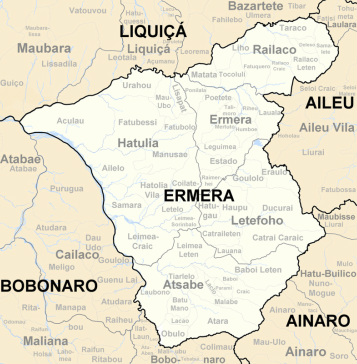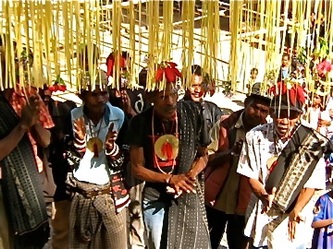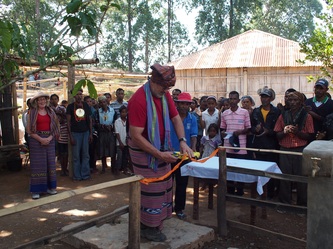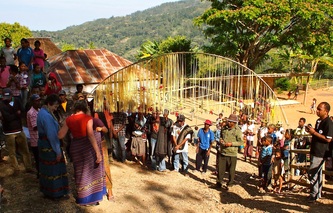On the evening of November 8th Andy & Mary Graham, Noel & Yve Bayley & Roger Cussens- a Warrnambool East Rotarian, left Melbourne for Darwin and on to Dili, Timor Leste, the following morning.
Arriving in Dili at 7.30am we were met by Eddie the linchpin of WET’s operations in Timor Leste.
Arriving in Dili at 7.30am we were met by Eddie the linchpin of WET’s operations in Timor Leste.
The morning was spent by Noel doing a clinic at Barre Pite Medical Clinic in Dili, screening potential patients to bring to Australia for heart surgery.
Andy and the rest of the team visited Victor Hardware Store to settle the account for materials that had been used to complete the three water projects, commenced in August.
A visit to the supermarket was part of the morning activities to buy supplies for Bahkita Centre, where we would be staying for the next two nights and some bags of rice for the two villages we would be visiting. We also purchased some activity books, pencils, pens and balls for the children in the village of Sauria and Lauala.
After lunch we left Dili for the slow journey to the Bahkita Centre in the Ermera District. The distance is only 58 kms but the journey took 2 hours. Fortunately for us the Wet had not yet arrived and although the clouds looked threatening at times, the weather for the two days was fine. This was a blessing as the roads have deteriorated even further since our August visit and with rain making the surface slippery and filling the potholes with water, it would have been extremely hazardous.
Andy and the rest of the team visited Victor Hardware Store to settle the account for materials that had been used to complete the three water projects, commenced in August.
A visit to the supermarket was part of the morning activities to buy supplies for Bahkita Centre, where we would be staying for the next two nights and some bags of rice for the two villages we would be visiting. We also purchased some activity books, pencils, pens and balls for the children in the village of Sauria and Lauala.
After lunch we left Dili for the slow journey to the Bahkita Centre in the Ermera District. The distance is only 58 kms but the journey took 2 hours. Fortunately for us the Wet had not yet arrived and although the clouds looked threatening at times, the weather for the two days was fine. This was a blessing as the roads have deteriorated even further since our August visit and with rain making the surface slippery and filling the potholes with water, it would have been extremely hazardous.
Arriving at Bahkita Centre late afternoon we were treated to a delicious afternoon tea of coffee and cake. The standard of food has improved remarkably over the years we have been visiting the Centre and currently is being performed by a very talented young cook, Rameno.
We set off early the next morning to visit the village of Sauria, where the first WET project had been commenced on the August visit.
Sauria is a small remote village about 30 minutes journey from the larger town of Letefoho. The reason for the early start was to try to avoid the potential afternoon rainstorm, which would have made the road to the village impassable. Even in the dry this journey is slow and not without its ‘deep breath’ moments.
This village even by Timor Leste standard is very poor. Unlike the village of Lauala where the third project was undertaken these villagers have little access to an income source such as coffee.
The majority of households in this village have never had easy access to clean drinking water. Over three quarters of the households now supplied with water only a short distance from their houses, were walking up to one km, uphill to the water source, an old concrete tank that had been installed during the Indonesian occupation.
This village of 620 residents, 87 families now have 5.5kms of pipe installed and 5 new holding tanks. A new dam has been constructed at the source of the spring and 18 tap-stands deliver water close to households.
The majority of this work was undertaken after we left in August by the villagers and the water team from Bahkita, who have learnt their skills from Andy, Darren Smith and Phil Kerr during their previous project visits. The Bahkita Water team is using equipment supplied by funds from Warrnambool East Rotary to make the tap stands.
The village of Sauria is very poor. Half the population is aged 0-5 years and families struggle to provide adequate food and essentials for the children to develop and remain healthy. A large number of children suffer malnutrition, vitamin deficiencies and worm infestations. They are prone to diseases due to poor hygiene, such as rhematic heart disease and diarrhoea.
Despite their economic poverty the village had collected $2.00 US per household $85.00 as their contribution to their water maintenance fund. This money is to be used for future repairs to the village water system. Villagers indicated that a $5.00 levy would be raised per household next year.
When we arrived at the village of Sauria a bamboo archway decorated with flowers had been erected at the entrance. The village elders greeted us with song and we were presented and dressed in traditional costumes. A group of young girls danced us into the village, accompanied by ladies playing traditional instruments. We were seated on a dais and first offered beetle nut, which Eddie advised us to accept even if we didn’t consume. Only Noel was brave enough to try. This was followed by traditional dishes of beans, sweet potato and coffee served in hand-carved bamboo cups, used only on very special occasions. Speeches of thanks were made and a suggestion that the village would welcome assistance to construct a public toilet. Currently none exists and toileting is undertaken in the bushes. What could we do but offer for our next project a public ablution block with toilets and laundry facility and two toilets with hand washing for the school?
We set off early the next morning to visit the village of Sauria, where the first WET project had been commenced on the August visit.
Sauria is a small remote village about 30 minutes journey from the larger town of Letefoho. The reason for the early start was to try to avoid the potential afternoon rainstorm, which would have made the road to the village impassable. Even in the dry this journey is slow and not without its ‘deep breath’ moments.
This village even by Timor Leste standard is very poor. Unlike the village of Lauala where the third project was undertaken these villagers have little access to an income source such as coffee.
The majority of households in this village have never had easy access to clean drinking water. Over three quarters of the households now supplied with water only a short distance from their houses, were walking up to one km, uphill to the water source, an old concrete tank that had been installed during the Indonesian occupation.
This village of 620 residents, 87 families now have 5.5kms of pipe installed and 5 new holding tanks. A new dam has been constructed at the source of the spring and 18 tap-stands deliver water close to households.
The majority of this work was undertaken after we left in August by the villagers and the water team from Bahkita, who have learnt their skills from Andy, Darren Smith and Phil Kerr during their previous project visits. The Bahkita Water team is using equipment supplied by funds from Warrnambool East Rotary to make the tap stands.
The village of Sauria is very poor. Half the population is aged 0-5 years and families struggle to provide adequate food and essentials for the children to develop and remain healthy. A large number of children suffer malnutrition, vitamin deficiencies and worm infestations. They are prone to diseases due to poor hygiene, such as rhematic heart disease and diarrhoea.
Despite their economic poverty the village had collected $2.00 US per household $85.00 as their contribution to their water maintenance fund. This money is to be used for future repairs to the village water system. Villagers indicated that a $5.00 levy would be raised per household next year.
When we arrived at the village of Sauria a bamboo archway decorated with flowers had been erected at the entrance. The village elders greeted us with song and we were presented and dressed in traditional costumes. A group of young girls danced us into the village, accompanied by ladies playing traditional instruments. We were seated on a dais and first offered beetle nut, which Eddie advised us to accept even if we didn’t consume. Only Noel was brave enough to try. This was followed by traditional dishes of beans, sweet potato and coffee served in hand-carved bamboo cups, used only on very special occasions. Speeches of thanks were made and a suggestion that the village would welcome assistance to construct a public toilet. Currently none exists and toileting is undertaken in the bushes. What could we do but offer for our next project a public ablution block with toilets and laundry facility and two toilets with hand washing for the school?
SAURIA VILLAGE WELCOME
An inspection of the water system to check it was all working was undertaken and then we were invited to partake in a beautifully presented meal of rice, noodles, chicken and pork. A pig had been killed in our honour. The unveiling of a memorial to Dr Janet Shepherd followed the meal. Funds to undertake this water project in Sauria had been provided by Mona Russell in memory of her daughter Janet.
We left Sauria feeling very positive with the outcome of this project and looking forward to continuing to work with the lovely people of this village.
We left Sauria feeling very positive with the outcome of this project and looking forward to continuing to work with the lovely people of this village.
Eight tap stands would supply water to the community maternal health clinic and 27 houses with 260 persons now having access to clean drinking water. 0.5kms of this pipeline was bringing water to families who had never had water close by before. Andy had advised the villagers on the original design and WET had provided the materials. However much of the work for this project had been undertaken by the villagers and the Bahkita Water Team, after we had left in August.
Once again on our arrival at the village we were danced into town. A beautiful meal was prepared for us and many speeches of thanks were made. This village had already collected $385 for their maintenance fund and wanted to increase this to over $400 in the next year.
They were looking to extend the pipeline a further 0.5kms and install 3 more tap stands to supply water to 10 houses (32 persons) if the flow allowed.
They had built covers for the tanks from bamboo, which not only looked good but also would be effective in reducing sun damage to the plastic tanks.
Once again on our arrival at the village we were danced into town. A beautiful meal was prepared for us and many speeches of thanks were made. This village had already collected $385 for their maintenance fund and wanted to increase this to over $400 in the next year.
They were looking to extend the pipeline a further 0.5kms and install 3 more tap stands to supply water to 10 houses (32 persons) if the flow allowed.
They had built covers for the tanks from bamboo, which not only looked good but also would be effective in reducing sun damage to the plastic tanks.




